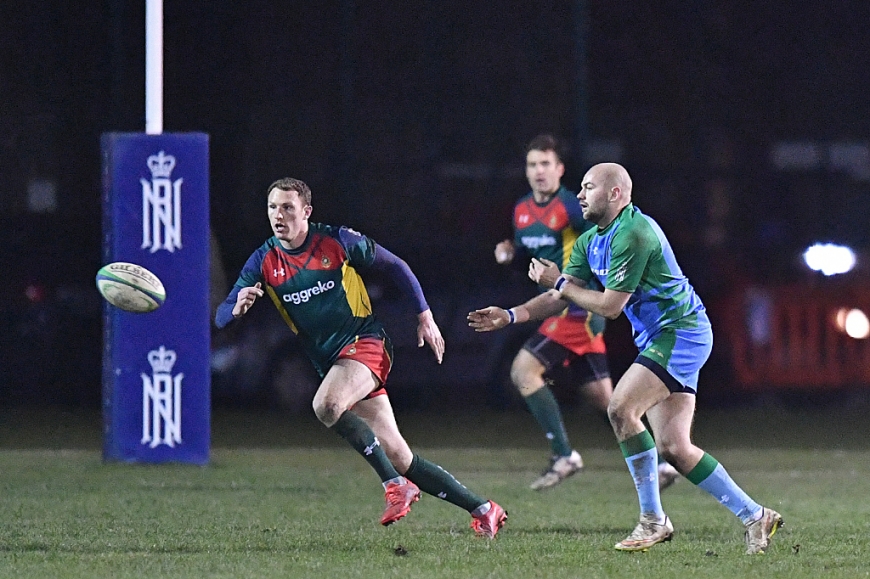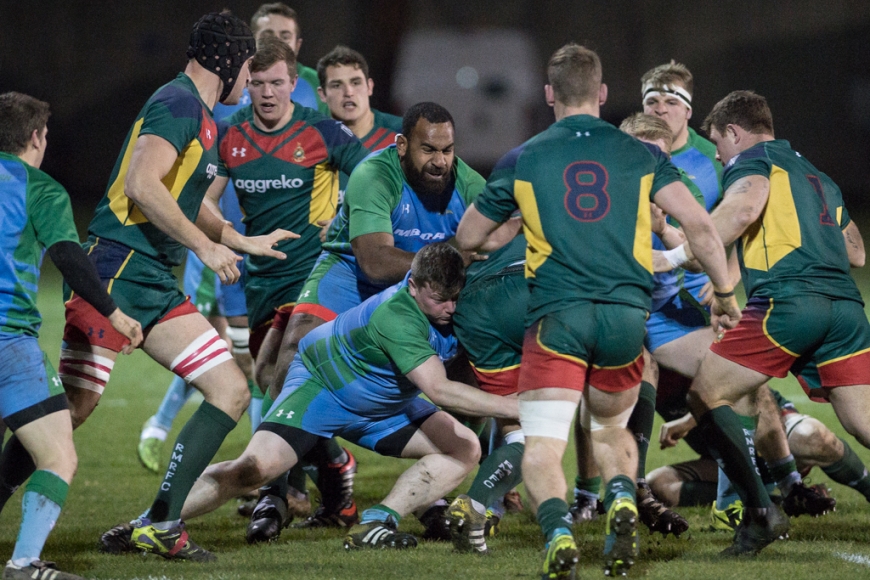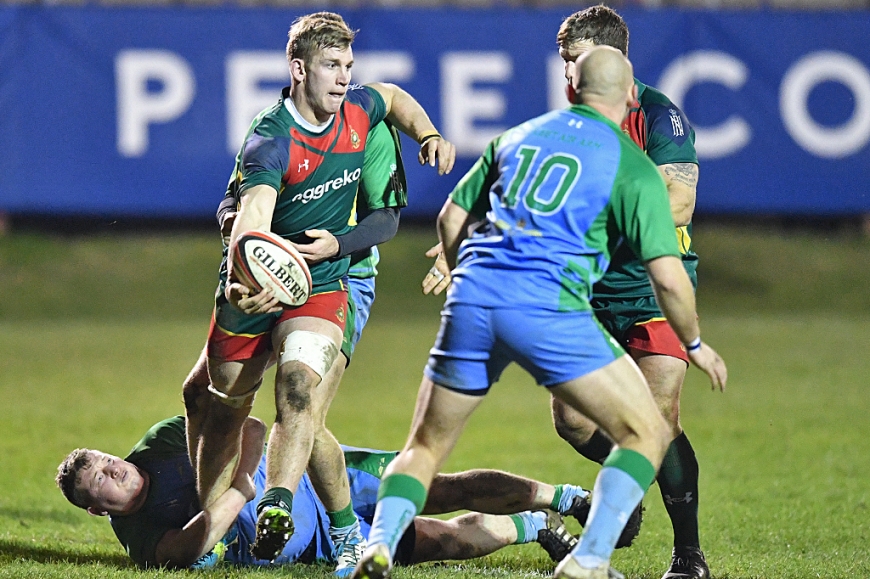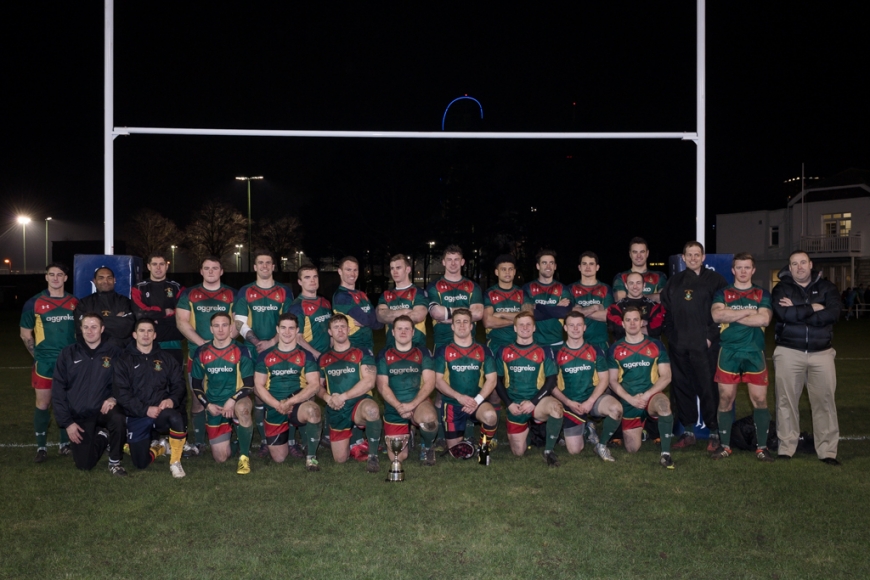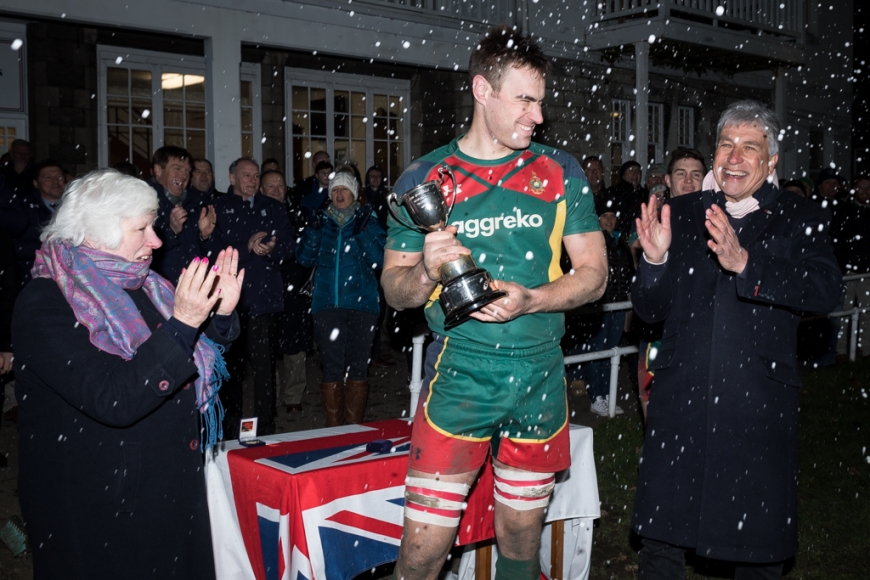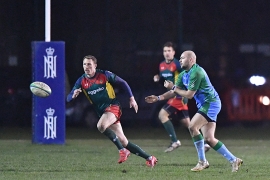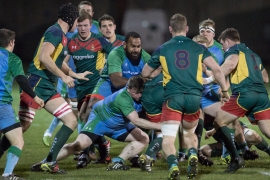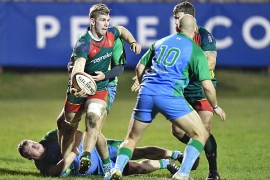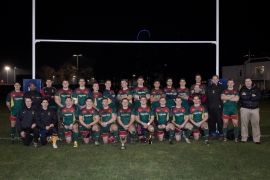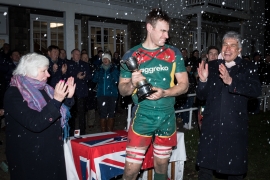Inverdale Challenge Trophy: A Game of Two 10s.
Royal Marines
Fleet Air Arm
The 2016/17 Inverdale Challenge Trophy ended with a try for the Fleet Air Arm but it was the Royal Marines who were victorious, with the scoreboard displaying 30 – 22, successfully defending their title as Inverdale Challenge Trophy winners. As both sides lined up at the start of the match a number of senior caps were clear to see; these two teams represent the pinnacle of Royal Navy regional rugby. However as the match progressed this was a game where the pivotal role played by the Fly Half was clear to see. Caddywould for the ‘Bootnecks’ and Horton for the ‘Wafus’ pulled the strings both in attack and defence.
The Royal Marines caught up in the emotion of the occasion and keen to bring their physicality to the early exchanges were penalised twice giving Horton an option for three easy points. Noting that the Marines were unsettled, he kicked for touch. Makepeace won the line-out and the driving maul allowed Lowe to cross the line for the first score which was converted by Horton, 0-7.
Then the tide turned and towards the end of the first quarter the RMs benefited from the penalty decisions and Caddywould converted to trail by four, 3–7. Building through the phases, balancing kicking for territory and putting the ball through the hands, the Royals switched the ball in midfield creating space wide for a looping mis-pass. A quick show and go and sublime arcing run from Caddywould resulted in a try for the Stand-Off and the lead for the first time in the match for the men in green, 8-7.
Regaining the lead following a penalty from Horton, (8-10) FAA centre Janes found space on the left touchline seizing 20 metres of territory. Following some tenacious work at the break-down, Royal were able to clear their lines after a well-executed out-plan. Both sides were putting on quite the spectacle with attacking enterprise and resolute defending.
Echoing rugby league, a cross field kick from Caddywould, following some yards from Hayler and quick hands from Bridgen, saw the ball arrive in the out stretched arms of the diving Gobey. The try was disallowed by the officials and the FAA should have gone into the changing rooms with the lead but for a serious of unfortunate events. Caddywould clattered a penalty off the upright; Wood, like all good wingers, followed up, gathered the ball to score to the bemusement of the defenders. Converted by Caddywould, it was the RMs who started the second half in the lead. RM 15 – 10 FAA.
Kicking deep into the FAA 22 but for Chambers’ awareness and clearance kick the RM could have scored another as the chasers bore down on the left wing. Making touch from the clearance, the RM line-out worked well. Running well in open play, agile lock Morris sucked in the defenders for Caddywould to replicate his try in the first half to ghost through the defence. Duly converting, the RM lead was extended to 12 points, 22-10.
Adding to another Caddywould penalty, (25-10) ten minutes into the second half, Hayler, now sporting a head band, stole 20 metres after a knock-on; attacking twice down the short side, spotting the overlap, Bridgen switched play with the ball arriving with substitute Pilkington to score, 30-10. An seemingly insurmountable lead of 20 points was established.
Changing the FAA props for the start of the second half brought success to the set-piece with Blackburn and Warner dominating their opposite numbers. A sequence of scrums saw a number of penalties awarded against the RM pack. From the back, FAA Number 8 and Navy rugby stalwart, Thompson scored an easy try for Horton to convert from out wide, 30-17.
The last 5 minutes of play was open and highly entertaining with both sides showing first rate inter play and good handling. A penalty was awarded for FAA handling on the ground only to be reversed for back chat and a minor fracas. RM Hayler subsequently left the pitch with a yellow card following his part in the altercation. Again at the scrum the FAA dominated, driving the lighter RM pack backwards. With no recourse to stop the drive but to pull down the scrum, Pilkington left the field with a second RM yellow card. In the final few seconds of the match a consolation score was all that the FAA could hope for and with a two man advantage, an overlap beckoned. A long rifled pass let substitute Campbell saunter across the line to score in the corner.
A match dominated by the playmakers at No 10, it was the packs that made life easy by going forward in attack and defending energetically. Deserved winners, the Royal Marines defended their title as Inverdale Challenge champions by beating a highly capable FAA team in a thrilling rugby match.
Royal Marines: Willman, Robinson, Jones; Mason, Morris; Cousons, Watt, Hayler; Bridgen, Caddywould; Gobey, Powell, Tabinavesi, Wood, Warrington.
Replacements: Bonnick, Myurgh, Southgate, Pilkington, Lines, O’Grady, Warboys.
Fleet Air Arm: Reynolds, Lowe, Burton; Mortensen, Makepeace; Kava, Carver, Thompson; Cox, Horton; Chambers, Janes, Nortman, Saberton, Clarke.
Replacements: Blackburn, Warner, Hunt, Tora, Holland, Campbell, Heard.
Officials (British Army): Max Marsden, Paulias Namata, Marcus Monier-Williams
Words by J Campbell-Baldwin.
Images Royal Navy Rugby Union © John Walton © Keith Woodland

